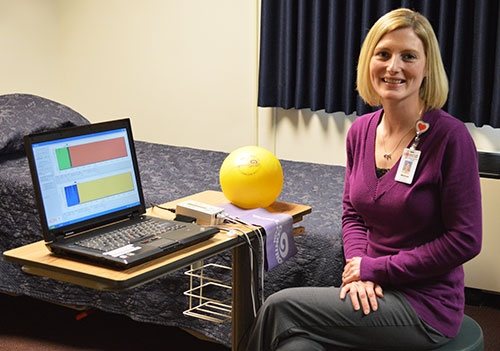You are here
Home ›April Is Occupational Therapy Month: Incontinence Treatment Program at Veterans Memorial Hospital proven effective

Incontinence treatment available at VMH ... April is Occupational Therapy Month. Pictured above is Melissa Clark, Occupational Therapist at Veterans Memorial Hospital. Over eight years ago she introduced the bladder and bowel incontinence treatment program at the hospital and has seen very positive results. This program is one of many specialties offered by the Occupational Therapy Department at Veterans Memorial Hospital. Submitted photo.
The Occupational Therapy Department at Veterans Memorial Hospital has had a bladder and bowel incontinence treatment program for over eight years. Staff member Melissa Clarke, Occupational Therapist, has been providing this treatment and has seen very positive results.
More people than one may think are impacted by bladder and bowel dysfunction. An average of 25-30% of adults 25-55 years old have experienced bowel or bladder problems. An average of 35-40% of individuals over 65 who live in the community have bladder and bowel problems, and 10-15% of children 8-16 years old have nighttime wetting. The good news is 61% of people using the Beyond Kegels program were dry in 3 ½ weeks.
“Many adults are taught to use kegel exercises for their incontinence, but this program does not include kegel exercises at all,” states Melissa Clarke, O.T. “Instead I instruct patients in different lifestyle changes and exercises that have been shown to be more effective than kegels. A few components of the program include lifestyle and nutrition changes, physiological quieting, roll for control exercises, biofeedback, and instruction in a home exercise program.”
People who can benefit from bladder and bowel dysfunction treatment include women, men, elderly adults, children, and pregnant/postpartum women. Not only has this program proven to decrease urine and bowel leaking, but it has also improved standing balance and low back pain.
“The pelvic floor muscles are delicate bowl shaped muscles that hold the bowel and bladder. Dysfunction occurs not because of weakness, but because of an imbalance in the pelvic muscles,” adds Clarke. “This imbalance can be seen through the use of our computerized biofeedback tool. This tool allows us and our patients to see their own pelvic muscle activity on a computer screen, then together we can begin the treatment for correction.”
“I felt it was an easy program to do and it eliminated my problem,” states Jean Kroack of Waukon. “I felt it was well worth the time and I felt very comfortable with Melissa. If anyone has a problem they need to contact their doctor and get an appointment with Melissa.”
Any bladder or bowel activity that results in lifestyle alterations, emotional changes or feelings of discomfort is a problem. By identifying specific impairments and the severity, the Veterans Memorial Hospital Occupational Therapy Department can assist with finding a solution.
Anyone who is suffering from urine or bowel leaking should visit their doctor to see if this local program may be beneficial. For more information, call the Veterans Memorial Hospital Rehabilitation Department at 563-568-3411.

